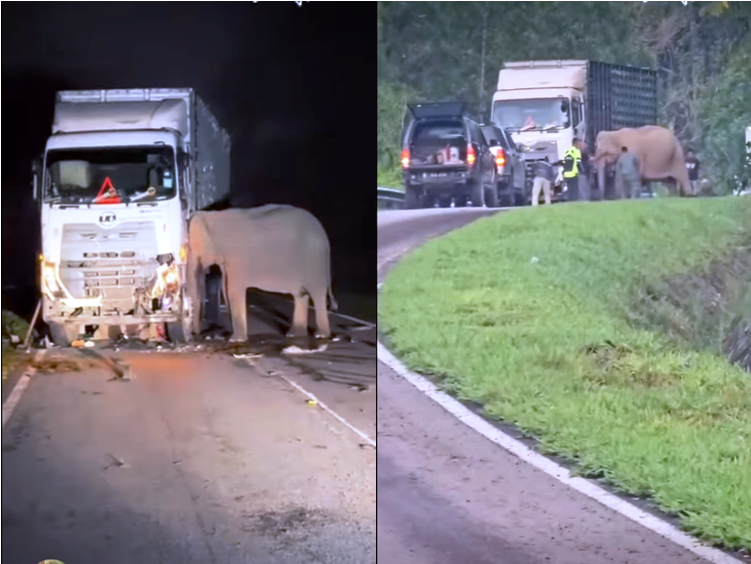
by Sam Trailerman
This year’s Mother’s Day witnessed scenes that evoked intense sadness in the early morning along Jalan Gerik-Jeli where a mother elephant was caught on video for refusing to leave her injured calf trapped beneath a truck laden with livestock.
The footage, captured by stranded motorists, has since gone viral, drawing an outpouring of emotions from not just Malaysia but other parts of the world.
The baby elephant, believed to have been struck by the truck while lingering on the poorly lit trunk road was subsequently lodged beneath the heavy vehicle. Moments later, its frantic mother emerged from the roadside, desperately trying to rescue her baby.
A witness claimed that the mother elephant, in a state of panic, tried to push the truck with her powerful frame, mistakenly causing further injuries to her trapped calf.
The tragic miscalculation left the calf pinned while the mother stood helplessly beside it, her anguished cries echoing through the jungle-lined road now and then.
The emotional standoff brought traffic to a complete halt for several hours while trapped onlookers were deeply moved to tears by the mother’s unwavering love for her baby.
The mother elephant’s tears were visible in the footage as she refused to budge. She just stood there, swaying and moaning, refusing to leave her baby.
Elephants don’t have the greatest eyesight in the animal kingdom, but they never forget a face. They have remarkable recalling power, researchers believe, and it’s a big part of how elephants survive.
Matriarch elephants, in particular, hold a store of social knowledge that their families can scarcely do without.
Women and elephants never forget an injury. Or so it goes according to H.H. Munro’s brief narrative.
ut as for elephants, extensive observations have confirmed that they indeed remember injuries or wrongs done to them and do hold grudges against their abusers.
Elephants are among the animals with very strong emotions. They do observe periods of “mourning”, especially mother elephants, although the exact length of time is hardly known.
Observations by biologists and wildlife researchers show that mother elephants and their herds will often be in close proximity to their dead calves for several hours to several days.
There have been recorded cases where mother elephants touch, shake, or stand around the dead calf, sometimes trying to “wake” it up.
Elephants can also show signs of depression, being quiet, not eating, and moving slowly after the loss of a calf, very similar to humans when they are in mourning.
Elephants also have very strong memories and social bonds, especially between mothers and calves. It’s a known fact that elephants can remember the location of the death of a family member and return to that place years later.
The gut-wrenching scene on Mother’s Day this year, which evoked so much sorrow, reminded us of the unconditional love from mothers. Call it the maternal instinct in humans and animals.
The videos from that dark Gerik-Jeli Highway ignited widespread attention in the social media as many pointed out to the two-year gestation of her baby in the womb. And her offspring later died in front of the mother.
During her moments of sadness, the mother elephant couldn’t care less about other vehicles. All she cared was her baby which was already dead.
Motorists have been reminded countless number of times when travelling along the East-West Highway, particularly in forested areas where wild animals are known to roam and cross public roads. The East-West Highway, which cuts through forested areas in northern Peninsular Malaysia, has been known for frequent wildlife-related accidents.
The shrinking habitat for the endangered Asian elephants is forcing them to come into increasing contact with humans. It’s the same for the Malayan tiger, tapir, panther, and most other large mammal species. But they are fully protected under the Wildlife Conservation Act 2010 where anyone who intentionally or otherwise kills any protected animal will face a hefty fine.
Should the truck driver be fined? We let the judge decide. But we certainly know where the body of public opinion is pointing at.
The onus is always on the driver of any vehicle to prevent any such incident. This is not an isolated case. In April 2024, another baby elephant was killed on the same highway after being struck by a sport utility vehicle.
Although we can’t measure the level of their grief like humans, their emotions and grief are very real.
Today, the mother elephant taught us what it means to love without asking for anything in return. Today, an elephant taught us what love and loyalty until death is.
WE